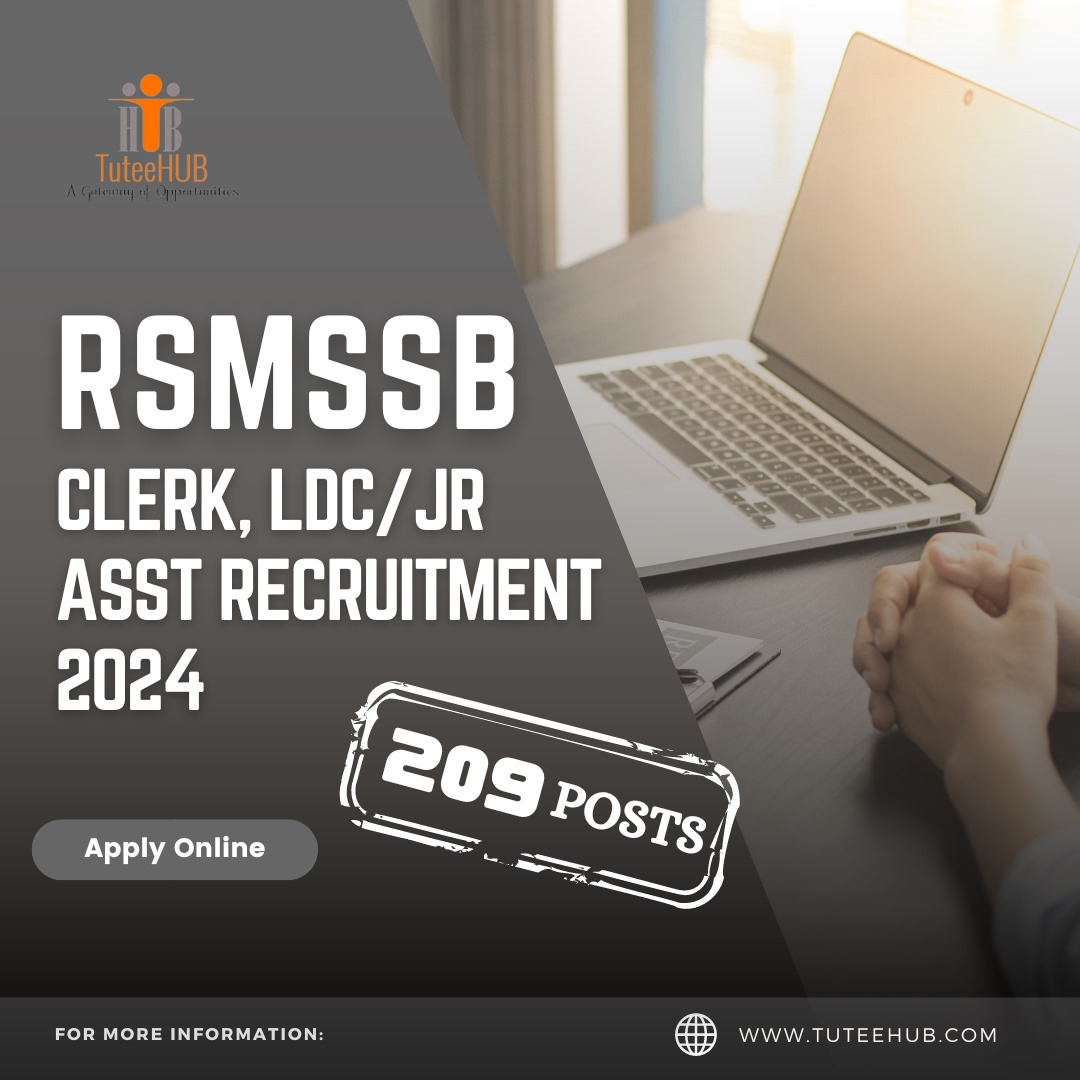Chapters
RSMSSB Clerk Exam

Overview
Chapter 1: Comprehensive Overview of the RSMSSB Clerk Exam Introduction to RSMSSB The Rajasthan Subordinate and Ministerial Services Selection Board (RSMSSB) is a renowned government agency responsible for conducting recruitment examinations for various subordinate and ministerial positions within the state of Rajasthan, India. RSMSSB plays a pivotal role in selecting qualified individuals for administrative, technical, and support staff positions within various departments and organizations under the Government of Rajasthan. Exam Overview The RSMSSB Clerk Exam is a competitive examination designed to assess the skills, knowledge, and abilities of candidates seeking to fill Clerk positions within various government departments and agencies in Rajasthan. The exam aims to identify candidates with the requisite qualifications and aptitude for performing clerical responsibilities efficiently and effectively. Eligibility Criteria To be eligible for the RSMSSB Clerk Exam, candidates must meet the following criteria: Educational Qualification: Candidates must possess a Senior Secondary Certificate (Class 12th) or its equivalent from a recognized board. Age Limit: Candidates must be between 18 and 40 years of age as on the date of the examination. Domicile: Candidates must be domiciled in the state of Rajasthan. Computer Proficiency: Candidates should possess basic computer proficiency and familiarity with common office software applications. Exam Pattern and Syllabus The RSMSSB Clerk Exam consists of two papers: Paper 1: General Knowledge and Aptitude General Knowledge (History, Geography, Polity, Economy, Current Affairs) Reasoning Ability (Verbal and Non-Verbal) Numerical Ability Computer Proficiency Paper 2: Rajasthan Specific Knowledge and Clerical Aptitude Rajasthan History, Culture, and Geography Rajasthan Government Schemes and Policies Office Procedures and Drafting Clerical Aptitude (Filing, Indexing, Data Entry) Each paper carries a maximum of 100 marks, with a total possible score of 200 marks. The time allotted for each paper is 2 hours. Assessment Methodology Candidates' performance is evaluated based on their scores in both papers. The minimum qualifying marks for each paper is 40%, and the overall minimum qualifying score is 50%. Only candidates who secure the minimum qualifying marks in both papers will be considered for further selection rounds. Selection Process The selection process for the RSMSSB Clerk Exam typically includes the following steps: Written Exam: Candidates who meet the eligibility criteria and successfully pass the written exam will proceed to the next stage. Document Verification: Candidates must submit original documents for verification of their educational qualifications, age, domicile, and other relevant details. Skill Test: Candidates may be required to undergo a skill test to assess their proficiency in computer applications and other clerical tasks. Interview: Shortlisted candidates may be invited for an interview to further assess their suitability for the position. Career Prospects Upon successful completion of the RSMSSB Clerk Exam and subsequent selection process, candidates will be appointed as Clerks in various government departments and agencies in Rajasthan. Clerk positions offer stable employment, opportunities for career advancement, and numerous benefits and perks. Importance of Preparation Given the competitive nature of the RSMSSB Clerk Exam, thorough preparation is essential for success. Candidates are advised to dedicate ample time and effort to studying the exam syllabus, practicing mock tests, and enhancing their overall knowledge and skills. By following a comprehensive preparation strategy, candidates can increase their chances of qualifying for the exam and securing a coveted Clerk position within the Government of Rajasthan. FAQs: What is RSMSSB? The Rajasthan Subordinate and Ministerial Services Selection Board is a government agency responsible for conducting recruitment exams for various positions in Rajasthan. What is the purpose of the RSMSSB Clerk Exam? To select candidates for Clerk positions within government departments in Rajasthan. What are the eligibility criteria for the exam? Senior Secondary Certificate (Class 12th), age between 18 and 40, Rajasthan domicile, computer proficiency. What is the exam pattern? Two papers: General Knowledge and Aptitude, and Rajasthan Specific Knowledge and Clerical Aptitude. What is the syllabus for each paper? Paper 1: General Knowledge, Reasoning Ability, Numerical Ability, Computer Proficiency Paper 2: Rajasthan History, Government Schemes, Office Procedures, Clerical Aptitude What is the minimum qualifying score? 40% in each paper and 50% overall. What is the selection process? Written exam, document verification, skill test, interview. What are the career prospects for successful candidates? Stable government employment, opportunities for advancement, benefits and perks. How important is preparation for the exam? Thorough preparation is crucial to increase chances of success. Where can I find more preparation resources? Refer to official RSMSSB website, study materials, mock tests, and online resources. Google Structured Data - FAQ in JSON-LD
Start TutorialTutorials are for educational purposes only, with no guarantees of comprehensiveness or error-free content; TuteeHUB disclaims liability for outcomes from reliance on the materials, recommending verification with official sources for critical applications.
Similar Tutorials

Advanced Excel Charts Tutorial: How to Create Prof...
Learn how to create professional charts in Excel with our advanced Excel charts tutorial. We'll show...

Advanced Excel Functions: Tips and Tricks for Boos...
Are you tired of spending hours working on Excel spreadsheets, only to find yourself stuck on a prob...

Apache Flume Tutorial: An Introduction to Log Coll...
Apache Flume is a powerful tool for collecting, aggregating, and moving large amounts of log data fr...
Explore Other Libraries
Related Searches
Please allow ads on our site
Kindly log in to use this feature. We’ll take you to the login page automatically.
Login
Join Our Community Today
Ready to take your education and career to the next level? Register today and join our growing community of learners and professionals.

Your experience on this site will be improved by allowing cookies. Read Cookie Policy
Your experience on this site will be improved by allowing cookies. Read Cookie Policy



Comments(0)